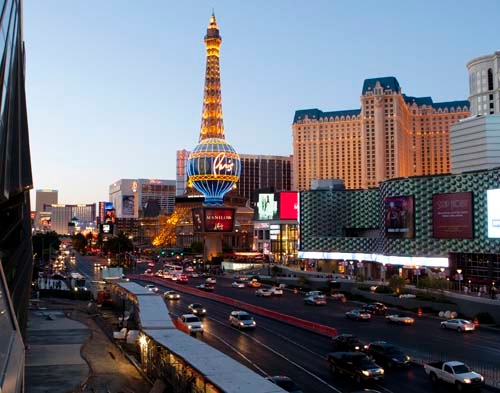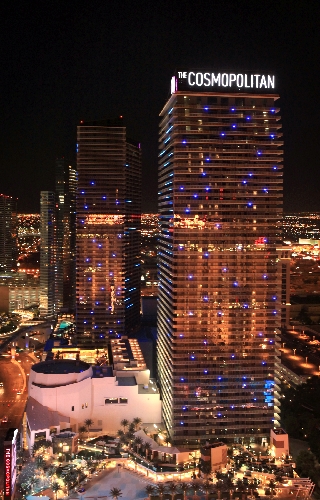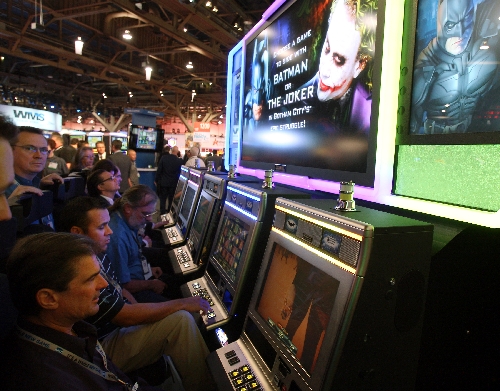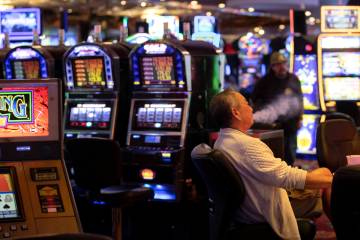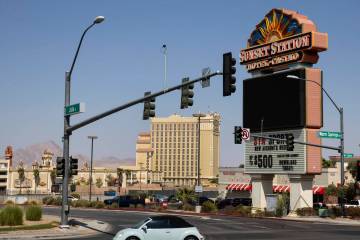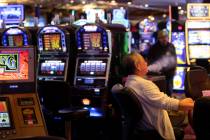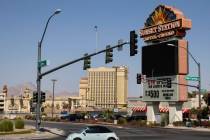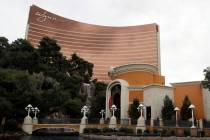Analysts say recovery is coming for casinos
The gaming industry is entering uncharted waters in 2011.
For the first time since 1989, the Strip will not witness a new hotel-casino opening nor are any new resort developments on the horizon.
The unprecedented building boom that covered parts of three decades and remade the look and image of the 4-mile-long boulevard is over.
It ended Dec. 15 with the unveiling of the $3.9 billion Cosmopolitan of Las Vegas.
Barring an unforeseen miracle -- and a multibillion-dollar cash infusion -- neither the shell of what was to have been Echelon nor the 70 percent-complete Fontainebleau will be finished anytime soon.
Other than possible hotel expansions -- the Cosmopolitan adding unopened rooms and Caesars Palace completing a 660-room tower mothballed since 2009 -- Las Vegas will not expand beyond its current base of roughly 150,000 rooms.
That's a good thing, analysts said.
Wall Street and industry observers believe the market is overbuilt and needs to absorb its existing capacity. Las Vegas tourism is slowly coming back and Nevada's gaming industry seems to be loosening the grips of a two-year-long recession.
Still, most analysts looking ahead to 2011 are calculated in their prognoses for a recovery.
"The numbers are going to start to look better because of what they are compared to," Macquarie Securities gaming analyst Chad Beynon said. "I'm cautious because I see minimal improvements in 2011."
Hudson Securities gaming analyst Robert LaFleur said Las Vegas was in a "protracted" recovery that is unfolding gradually. Hotel room pricing, a key metric analysts use to gauge a resort destination's profitability, is starting to improve.
Still, how consumer spending grows and any increased rate of discretionary expenditures in the early half of 2011 will allow analysts to measure the speed of any recovery.
"We're in a period of austerity," LaFleur said. "We're deleveraging personally, paying down debt and unwinding the excesses of the last cycle. A trip to Las Vegas is still seen as somewhat extravagant, so the market is going to take time to come back."
Guarded might be the best description analysts have on the gaming industry's prospects in 2011.
Casino operators cut costs over the past two years, eliminating staff and overhead. Corporations took steps to reduce their long-term debt loads, either paying down old debt or extending out maturity dates to buy time until the market's recovery is more stable.
Three companies -- Tropicana Entertainment, Herbst Gaming and locals gaming giant Station Casinos -- went through bankruptcy court-administered restructurings that eliminated debt and put the businesses on the road toward recovery. But the bankruptcies came with a cost, as management was either kicked out of the business or had its ownership stakes reduced.
Union Gaming Group Principal Bill Lerner said the gaming industry has been in survival mode since 2008. Now, much of the pressure appears to have subsided. The businesses are hoping to start reaping the benefits of those moves.
But it may be 2012 before real recovery comes.
"In 2011, I think there will be some harvesting on many fronts based on the important seeds of meaningful cost-cutting measures that were planted last year," Lerner said. "There is going to be some noticeable improvement, but whether or not that translates into significant profit recovery remains to be seen."
The raw numbers through October in Nevada signal a slight recovery.
Visitation in Las Vegas is up 2.8 percent through the year's first 10 months.
Gaming revenues in Nevada are up 1 percent compared with 2009. The revenue figure is not large, but compared with 2009's full-year statewide decline of 10.4 percent and 2008's drop of 9.7 percent, analysts have wary optimism.
On the Strip, casino revenues are up 5.4 percent through October. But 2009's total gaming revenue figure of $5.5 billion was the Strip's lowest figure since 2003.
Recovery still has a way to go.
Wells Fargo Securities gaming analyst Dennis Farrell Jr. said there are positives with Las Vegas not having new gaming development on the horizon.
The industry bottomed out in 2010, he said; a gradual recovery is beginning to take place.
Consumer confidence, he said, appears to be slowly coming back. Las Vegas' convention business is starting to pick up, which benefits the big convention hotels operated by MGM Resorts International, Las Vegas Sands Corp. and Harrah's Entertainment.
Filling hotel rooms during slow, middle-of-the week periods is still the challenge facing operators.
"I'm going to use a basketball analogy," Farrell said. "The gaming industry has been playing defense, protecting the ball in their court as hotel supply increased. Now, the Strip casinos are on offense. They have the ball and can be aggressive in going after customers and consumers.
"We're also going to see a shift in demand, which is also good for operators."
Analysts don't foresee much merger and acquisition activity in 2011.
Penn National Gaming will complete its purchase of M Resort, buying $860 million in debt for $230.5 million. Penn would like to acquire a property on the Strip, but the time for that deal seems to have passed.
"For some of these companies with debt, the opportunities made sense a while back," Beynon said. "That changed as they reworked their obligations and took care of their balance sheets. I see very few opportunities."
Farrell agreed. Many of the casinos that could be on the market have large amounts of debt attached to their potential purchase prices.
Analysts thought regional markets would fare well in 2011.
Legislative debate is expected to take place on potential new jurisdictions for gaming expansion in Texas, Kentucky and Massachusetts.
Lerner thought Massachusetts was the likeliest state to legalize some form of casino gambling in 2011, while speculation will continue to center on Texas, the largest state without casinos.
"The passage of gaming in Texas is relatively onerous and would require a change to the state's constitution," Lerner said. "While Texas approved a lottery in 1992, it has not been the panacea for public education as promised. Various gaming expansion attempts have been foiled by the reality of this experience."
LaFleur called Texas the gaming industry's "Holy Grail." Any movement toward casinos in Texas could hurt other markets, such as Oklahoma, which draws customers from northern Texas and the Dallas area, and western Louisiana, which has its biggest customer base in Houston.
However, the continued gaming growth in eastern states, such as Pennsylvania, Delaware and New York, will continue to hurt Atlantic City, where monthly gaming revenues have fallen for more than two years running .
What can save Atlantic City?
"A Category 5 East Coast hurricane that turns left at the Showboat," LaFleur said. "I really don't know what can be done."
Contact reporter Howard Stutz at hstutz@reviewjournal.com or 702-477-3871.



